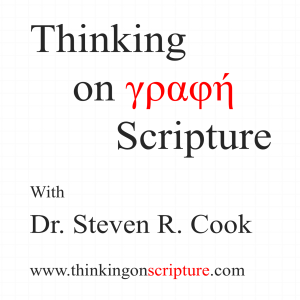
Saturday Nov 23, 2019
Zephaniah 3:1-8
God opens with a charge against wicked Israelites who were called “rebellious and defiled.” So corrupt and systemic was their oppressive behavior, the whole of Jerusalem became known as “the tyrannical city.” The word tyrannical translates the Hebrew יָנָה yanah, which denotes “to cheat, annoy (with words), oppress, [or] be violent.”[1] The word is used in the Mosaic Law to forbid Israelites from oppressing foreigners (Ex 22:21-24; Lev 19:33), slaves (Deu 23:15-16), or engaging in harmful economic practices (Lev 25:14-17). God spoke through Jeremiah, saying, “Do justice and righteousness, and deliver the one who has been robbed from the power of his oppressor. Also do not mistreat [יָנָה yanah] or do violence to the stranger, the orphan, or the widow; and do not shed innocent blood in this place” (Jer 22:3; cf. Eze 22:7, 29; 46:18). The meaning of Zephaniah 3:1 is the same. It is always possible for God’s people to behave poorly, like the world around them. Zephaniah declared their faults, saying, “She heeded no voice, she accepted no instruction. She did not trust in the LORD, she did not draw near to her God” (Zep 3:2). We should remember that Josiah, a good king, was on the throne and leading national reforms across the nation, seeking to lead God’s people back into His will (2 Ki 23:1-25); however, in spite of his efforts, the city’s leadership continued with their corrupt practices. The princes represented the aristocracy, who should have been behaving nobly and seeking God’s will, but instead, had become “roaring lions” who went about on the prowl seeking people to devour for their own personal gain (Zep 3:3a). The judges, who were civil magistrates, should have been upholding God’s Law, but instead, were like “wolves at evening” that devour their prey, from whom the citizens of the city had to protect themselves (Zep 3:3b). Furthermore, the prophets were described as “reckless, treacherous men” who falsely spoke in the name of the Lord and led others astray (Zep 3:4a). And the priests “profaned the sanctuary” by not performing their duties, and by making common that which was sacred (Zep 3:4b). In contrast with the corrupt leadership, “The LORD is righteous within her; He will do no injustice. Every morning He brings His justice to light; He does not fail” (Zep 3:5a). God is righteous, and He is just in all His ways; He reveals Himself to His people every day, and He does this without fail (cf. Deu 32:4), but they were suppressing His revelation. Though God leads His people into righteousness, “the unjust knows no shame” as they turn away from Him (Zep 3:5b). God had judged the surrounding nations as a warning to Judah, saying, “I have cut off nations; their corner towers are in ruins. I have made their streets desolate, with no one passing by; their cities are laid waste, without a man, without an inhabitant” (Zep 3:6). Though this was revealed to His people, yet, they chose their own way. God said, “Surely you will revere Me, accept instruction. So her dwelling will not be cut off according to all that I have appointed concerning her. But they were eager to corrupt all their deeds” (Zep 3:7). God then turns from talking to the rebellious Israelites in the city and addresses the faithful remnant, telling them, “Listen to Me,” as He speaks of future events. The Lord states there will come a day “when I rise up as a witness. Indeed, My decision is to gather nations, to assemble kingdoms, to pour out on them My indignation, all My burning anger; for all the earth will be devoured by the fire of My zeal” (Zep 3:8). God had already made it clear He was going to judge the Jews and Gentiles of Zephaniah’s generation, which, in many ways, had become a microcosm of all humanity, all throughout history. The Lord’s judgment would now extend to a global judgment that will come upon “all the earth.”
- "The world is still waiting for the Lord to pour out His wrath on all nations. He has not done so yet because He is patient and is giving people time to repent (cf. 2 Pet. 3:9). Yet that day will surely come (2 Pet. 3:10). In view of its coming, Christians need to be holy in conduct and godly in character looking for and hastening that day (by our prayers and preaching, 2 Pet. 3:11). The great outpouring of divine wrath on the earth predicted here will take place during the Tribulation, before our Lord returns to set up His kingdom (cf. 2:2; Zech. 14:2; Rev. 16:14, 16)."[2]
[1] Ludwig Koehler et al., The Hebrew and Aramaic Lexicon of the Old Testament (Leiden: E.J. Brill, 1994–2000), 416.
[2] Tom Constable, Tom Constable’s Expository Notes on the Bible (Galaxie Software, 2003), Zep 3:8.
No comments yet. Be the first to say something!